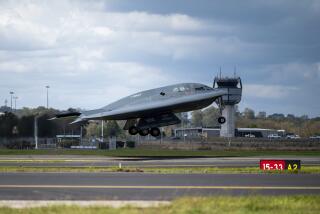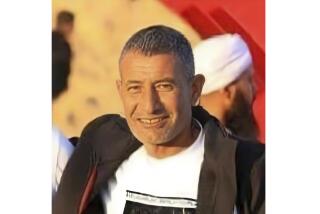Yemeni militants threaten to kill American after failed rescue attempt
- Share via
reporting from Cairo — The emergence of the latest video of an American hostage in hostile hands in the Middle East -- this time in the chaotic state of Yemen -- illustrates the frustrating reality that overwhelmingly superior military force cannot be relied upon to extract U.S. citizens in peril.
What in recent months has become a sickeningly familiar scenario in the region also points to the broader difficulties underpinning Western attempts to stabilize impoverished but strategic Yemen, positioned alongside key oil-shipping routes.
Over the last two months, Shiite Muslim Houthi rebels have seized control of the capital, Sana, and grabbed chunks of territory elsewhere in the country, even as one of the world’s most dangerous Al Qaeda affiliates continues to pose a serious threat.
It is that group, Al Qaeda in the Arabian Peninsula or AQAP, that claims to be holding Luke Somers. The 33-year-old photojournalist went missing in Sana in September last year. In the video obtained this week by the SITE intelligence group, a local Al Qaeda commander threatened to kill Somers within three days of the video’s release if unspecified Al Qaeda demands were not met.
Though Somers was not paraded under the knife in the manner of the grim series of recorded executions of Westerners held captive in Syria by the Sunni Muslim militants of the Islamic State, the video made it clear that he was well aware of the danger in which he found himself.
Wearing glasses and speaking calmly, Somers, who said he is British-born but holds American citizenship and spent much of his life in the United States, appealed for any measures possible to win his release.
“Basically, I’m looking for any help that can get me out of this situation,” he said. “I’m certain that my life is in danger. So as I sit here now, I ask, if anything can be done, please let it be done.”
Ironically, it may have been an attempt to free him that heightened his peril. A joint U.S.-Yemeni raid on Nov. 25 in a remote area of the country, which freed eight captives -- a Saudi, an Ethiopian and six Yemenis -- had been launched in hopes of also rescuing Somers and other Westerners known to be held, U.S. officials confirmed Thursday.
“This operation was conducted in partnership with the armed forces of Yemen and involved air and ground components,” Pentagon spokesman Rear Adm. John Kirby said. “Some hostages were rescued, but others -- including Somers -- were not present at the targeted location.”
Details about the mission remain classified, he said. By some accounts, Somers and others were moved days before the strike.
Bernadette Meehan, a spokeswoman with the National Security Council, said in a statement that President Obama authorized the operation last month. “At this difficult time, our thoughts remain with the Somers family, and with the families and loved ones of every other U.S. citizen being held hostage overseas,” she said.
Somers’ family in turn released a video statement pleading for his safe return.
“Luke is only a photojournalist and he is not responsible for any action the U.S. government has taken,” his brother Jordan said. “Please understand that we had no prior knowledge of the rescue attempt for Luke and we mean no harm to anyone.” he added.
The video released by the Al Qaeda group warned against any further rescue bids.
“There is no aggression but against the aggressors,” Nasser bin Ali Ansi, a local leader of the Al Qaeda affiliate in Yemen, said in the video, according to the SITE translation. Warning against “any other foolish action” on the part of U.S. forces, Ansi vowed that Somers would meet “his inevitable fate” unless previous demands by the organization -- with which he claimed the Obama administration was familiar -- were met.
As Yemen has slid deeper into turmoil, its Al Qaeda affiliate has been under increasing pressure not only from U.S.-led drone strikes but from the Houthi rebels loyal to Shiite Iran, lending fuel to sectarian fires raging across the region. In Yemen, as elsewhere, the American administration has sought to prop up a fragile central government and lend support to a national army under central command, but to little apparent avail.
Iran denies providing formal assistance to the Houthis, but the Shiite group’s rise to prominence in Yemen has raised alarm in neighboring Saudi Arabia, the region’s main Sunni power and Iran’s bitter rival. Iran and Saudi Arabia are already locked in proxy conflicts in Libya and Syria, and Yemen could be emerging as a new front in that battle.
AQAP has staged a number of attacks against Houthi and Shiite targets, including the bombing of a Houthi checkpoint in October that killed nearly 50 people.
An bomb attack this week bore the hallmarks of the group, although there was no claim of responsibility. The blast Wednesday outside the Iranian ambassador’s residence in Sana killed at least three people, including the bomber.
At a time of growing turmoil in the Yemeni capital, that bombing demonstrated attackers’ ability to strike at will in one of Sana’s most closely guarded districts.
Tensions are growing daily. On Wednesday, four security officials died in separate assassinations in different parts of the city. The crime rate is rising. This week, Houthis overran the home of a former prime minister.
For years now, abductions have been a lucrative franchise for Al Qaeda, and some past captives in Yemen -- seized either by militants or tribesmen or an amalgam of the two -- have been freed with the payment of ransoms. The United States and Britain have taken a public stance against any such payoffs.
Staff writer W.J. Hennigan in Washington and special correspondents Zaid Ali in Sana and Nabih Bulos in Beirut contributed to this report.
Follow @laurakingLAT on Twitter for news out of the Middle East
More to Read
Sign up for Essential California
The most important California stories and recommendations in your inbox every morning.
You may occasionally receive promotional content from the Los Angeles Times.










